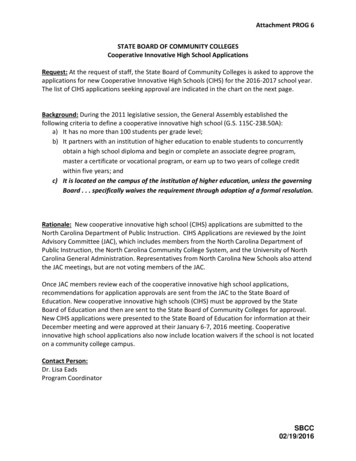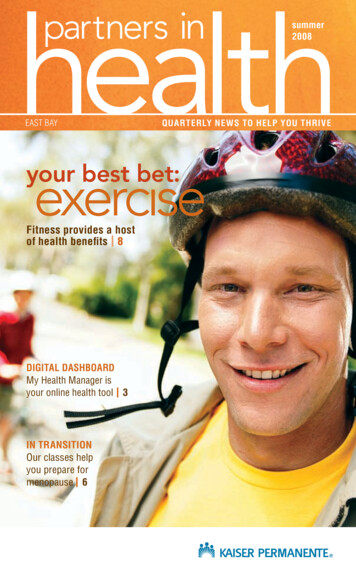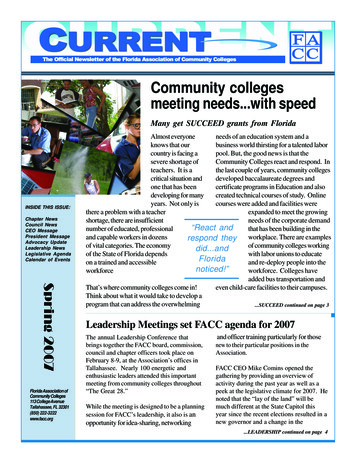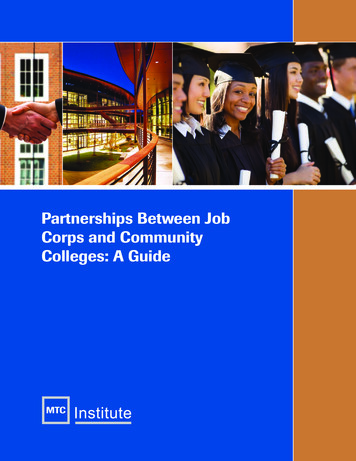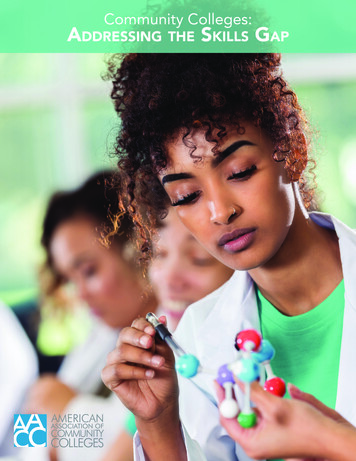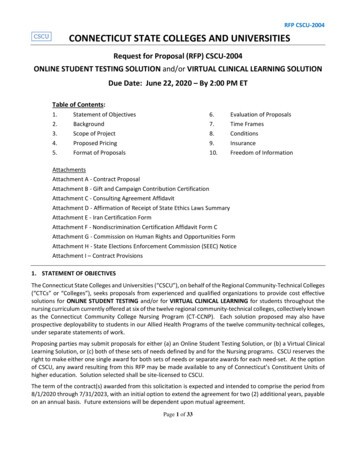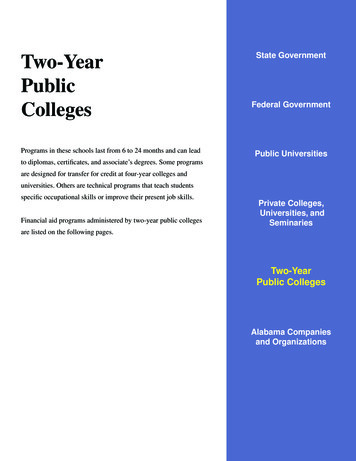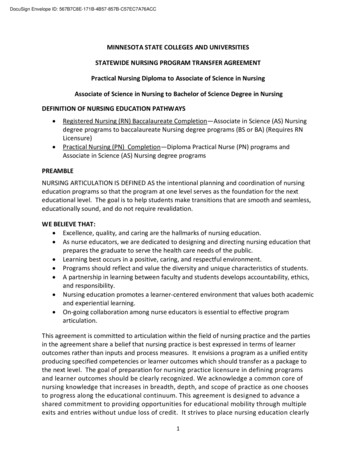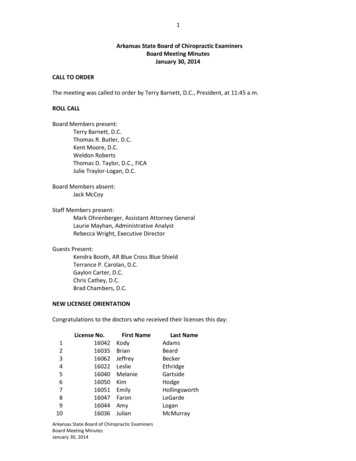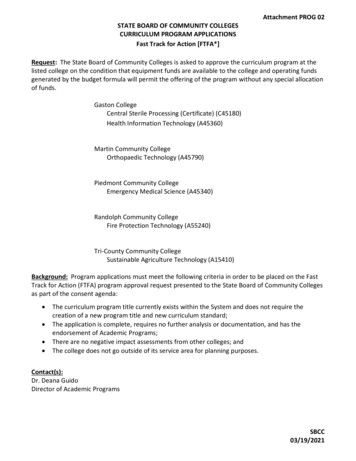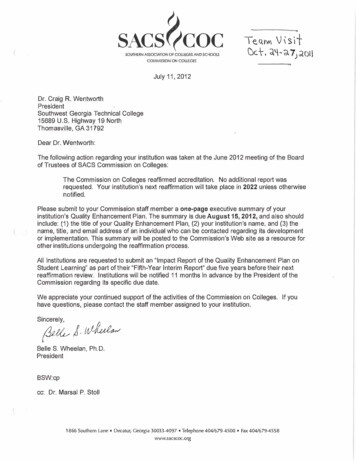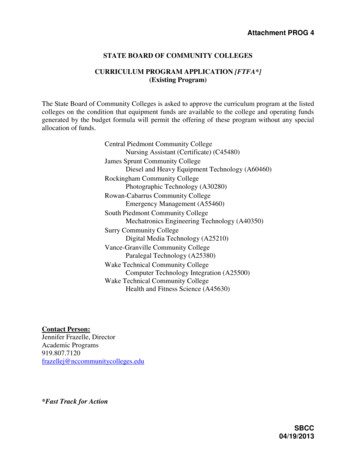
Transcription
Attachment PROG 4STATE BOARD OF COMMUNITY COLLEGESCURRICULUM PROGRAM APPLICATION [FTFA*](Existing Program)The State Board of Community Colleges is asked to approve the curriculum program at the listedcolleges on the condition that equipment funds are available to the college and operating fundsgenerated by the budget formula will permit the offering of these program without any specialallocation of funds.Central Piedmont Community CollegeNursing Assistant (Certificate) (C45480)James Sprunt Community CollegeDiesel and Heavy Equipment Technology (A60460)Rockingham Community CollegePhotographic Technology (A30280)Rowan-Cabarrus Community CollegeEmergency Management (A55460)South Piedmont Community CollegeMechatronics Engineering Technology (A40350)Surry Community CollegeDigital Media Technology (A25210)Vance-Granville Community CollegeParalegal Technology (A25380)Wake Technical Community CollegeComputer Technology Integration (A25500)Wake Technical Community CollegeHealth and Fitness Science (A45630)Contact Person:Jennifer Frazelle, DirectorAcademic edu*Fast Track for ActionSBCC04/19/2013
Attachment PROG 4APROGRAM APPLICATIONSUMMARY EVALUATION REPORTCentral Piedmont Community CollegeNursing Assistant (Certificate) (C45480)I.Program PlanningCentral Piedmont Community College is seeking approval for the Nursing Assistant (Certificate)(C45480) program to begin Fall 2013. The planning area is defined as the college’s service areaof Mecklenburg County. All colleges were notified of the planning process for this program.The proposed program was approved by the Board of Trustees at Central Piedmont CommunityCollege on October 26, 2012. Minutes from this Board meeting were attached to the programapplication. The President and the Board of Trustees of Central Piedmont Community Collegehave certified the following:The proposed program will enhance the workforce of North Carolina, will provideeducational and training opportunities consistent with the mission of the college, and willnot duplicate the opportunities currently offered.They have assessed the need for the proposed program and the resources required tomaintain a viable program and certify that the college can operate the proposed programefficiently and effectively within the resources available to the college.The college will complete a program accountability report including student successmeasures, enrollment trends, completion rates, and employment data three years afterimplementation of the program.II.Program RationaleCentral Piedmont Community College (CPCC) indicates the following:Today’s growing population of elderly Americans, along with the number of individualswith disabilities or other chronic conditions, is outpacing the number of workers with theknowledge and skills to effectively care for them. It is estimated seventy to eightypercent of the hands-on assistance to individuals with long-term and personal assistanceneeds are provided by direct care workers. Direct care workers include the following:nursing aides, home health aides, and personal care aides. In the U.S., the direct-careworkforce surpassed 3.3 million in 2010 and an additional 1.6 million new positions isprojected by 2020. (Paraprofessional Healthcare Institute, February 2013)The North Carolina metropolitan area of Charlotte-Gastonia-Concord was number ten innational rankings for fastest growing in the sixty-five and over population between 2000and 2010. (UNC Institute on Aging)According to UNC’s Institute on Aging in 2011, thirty-five percent of the population inMecklenburg County was sixty years of age or older. Data obtained from the NC StateData Center projected in 2025, forty-five percent of the county’s population will be sixtyyears of age or older.SBCC04/19/2013
Attachment PROG 4AIn 2011, the U.S. Department of Health and Human Services Task Force on Agingreported nationally seventy-seven million baby boomers would turn sixty-five years ofage that year. They also projected by 2025 the number of Medicare recipients will reach69.3 million and represent 20.6% of the U.S. population.An increasing aging population will have more medical conditions which will require anincrease in health care professionals. Research demonstrates a growing shortage of nurseaides both nationally and state-wide. The NC Long-Term Occupational Projections for2006-2016 ranked hospitals and nursing/residential care facilities as top industries withgrowing employment. As a state, they estimate we have 6,500 nurse aide vacanciesannually.Personal care aides and home health aides are projected to be the fastest-growingoccupations in the country between 2010 and 2020, increasing seventy-one percent andsixty-nine percent, respectively. Nursing aides, orderlies and attendants are expected toincrease by twenty percent. (Paraprofessional Healthcare Institute, February 2013)The Division of Employment Security/NC Department of Commerce reports between2008-2018 personal and home care aides, home health aides, and psychiatric aides areranked number sixteen, nineteen and twentieth respectively as fastest growingoccupations by percentage in the Charlotte Works Workforce Development Board region(Mecklenburg County).The Division of Employment Security/NC Department of Commerce reports between2008-2018 home health aides ranked number two as fastest growing occupations by jobgrowth with a total of 3,330 openings in Charlotte Works region.III. Impact of the Proposed Program on Other ProgramsThirty-two community colleges are approved to offer the Nursing Assistant program. An impactassessment was sent to each college. No negative impact responses were received.IV. Implementation of Collaborative PlanNot ApplicableV. Curriculum DesignThe proposed program of study is in compliance with the State Board approved curriculumstandard.Coordinator: Ms. Renee BattsSBCC04/19/2013
Effective TermSpring 2006[2006*01]CURRICULUM STANDARDCurriculum Program TitleCodeNursing Assistant (Certificate)ConcentrationC45480(not applicable)Curriculum DescriptionThe Nursing Assistant curriculum prepares individuals to work under the supervision of licensed health careprofessionals in performing nursing care and services for persons of all ages.Course work emphasizes growth and development throughout the life span, personal care, vital signs,communication, nutrition, medical asepsis, therapeutic activities, accident and fire safety, householdenvironment and equipment management; family resources and services; and employment skills.Graduates of this curriculum may be eligible to be listed on the registry as a Nursing Assistant I and NursingAssistant II. They may be employed in home health agencies, hospitals, clinics, nursing homes, extended carefacilities, and doctors’ offices.Curriculum Requirements*[for associate degree, diploma, and certificate programs in accordance with 23 NCAC 02E.0204 (3)]I.General Education. Degree programs must contain a minimum of 15 semester hours including at least one coursefrom each of the following areas: humanities/fine arts, social/behavioral sciences, and natural sciences/mathematics.Degree programs must contain a minimum of 6 semester hours of communications. Diploma programs must contain aminimum of 6 semester hours of general education; 3 semester hours must be in communications. General education isoptional in certificate programs.II.Major Hours. AAS, diploma, and certificate programs must include courses which offer specific job knowledge andskills. Work experience, including cooperative education, practicums, and internships, may be included in associate inapplied science degrees up to a maximum of 8 semester hours of credit; in diploma programs up to a maximum of 4semester hours of credit; and in certificate programs up to a maximum of 2 semester hours of credit. (See second page foradditional information.)III.Other Required Hours. A college may include courses to meet graduation or local employer requirements in acertificate, diploma, or associate in applied science program. These curriculum courses shall be selected from theCombined Course Library and must be approved by the System Office prior to implementation. Restricted, unique, or freeelective courses may not be included as other required hours.AASDiplomaCertificateMinimum General Education Hours1560Minimum Major Hours493012Other Required Hours0-70-40-164-7636-4812-18Total Semester Hours Credit (SHC)*Within the degree program, the institution shall include opportunities for the achievement of competence in reading, writing, oral communication, fundamentalmathematical skills, and basic use of computers.
Major Hours[ref. 23 NCAC 02E.0204 (3)]A.Core. The subject/course core is comprised of subject areas and/or specific courses which are required for eachcurriculum program. A diploma program offered under an approved AAS program standard or a certificate which is thehighest credential level awarded under an approved AAS program standard must include a minimum of 12 semesterhours credit derived from the subject/course core of the AAS program.B.Concentration (if applicable). A concentration of study must include a minimum of 12 semester hours credit fromrequired subjects and/or courses. The majority of the course credit hours are unique to the concentration. The requiredsubjects and/or courses that make up the concentration of study are in addition to the required subject/course core.C.Other Major Hours. Other major hours must be selected from prefixes listed on the curriculum standard. Amaximum of 9 semester hours of credit may be selected from any prefix listed, with the exception of prefixes listed inthe core or concentration. Work experience, including cooperative education, practicums, and internships, may beincluded in associate in applied science degrees up to a maximum of 8 semester hours of credit; in diploma programs upto a maximum of 4 semester hours of credit; and in certificate programs up to a maximum of 2 semester hours of credit.Nursing Assistant (Certificate) C45480Minimum Major Hours RequiredA.COREAASDiplomaCertificate49 SHC30 SHC12 SHC14 SHCRequired Courses:NASNASNAS101 Nursing Assistant I102 Nursing Assistant II103 Home Health Care6 SHC6 SHC2 SHCRequired Subject Areas:NoneB.CONCENTRATION (Not applicable)C.OTHER MAJOR HOURSTo be selected from the following prefixes:CIS, COE, CSC, HSC, MED, NAS, and PSYForeign language courses (including ASL) that are not designated asapproved other major hours may be included in all programs up to amaximum of 3 semester hours of credit.Approved by the State Board of Community Colleges on November 13, 1996; SBCC Revised 05/17/02; SBCC/CRC Revised 03/09/05; Revised 03/06/06; SBCCRevised 09/21/07; SBCC Template Revised 10/17/08; Editorial Revision 02/11/13.
Attachment PROG 4BPROGRAM APPLICATIONSUMMARY EVALUATION REPORTJames Sprunt Community CollegeDiesel and Heavy Equipment Technology (A60460)I.Program PlanningJames Sprunt Community College (JSCC) is seeking approval for the Diesel and Heavy EquipmentTechnology (A60460) program to begin Fall 2013. The planning area is defined as the college’s servicearea of Duplin County. All colleges were notified of the planning process for this program.The proposed program was approved by the Board of Trustees at James Sprunt CC on January 15, 2013.Minutes from this Board meeting were attached to the program application. The President and theBoard of Trustees of JSCC have certified the following:The proposed program will enhance the workforce of North Carolina, will provide educationaland training opportunities consistent with the mission of the college, and will not duplicate theopportunities currently offered.They have assessed the need for the proposed program and the resources required to maintain aviable program and certify that the college can operate the proposed program efficiently andeffectively within the resources available to the college.The college will complete a program accountability report including student success measures,enrollment trends, completion rates, and employment data three years after implementation ofthe program.II.Program RationaleJames Sprunt Community College indicated the following:The U.S. Bureau of Labor Statistics Occupational Outlook Handbook indicates a 15% increase inDiesel Service Technician positions from 2010-20.Representatives from House of Raeford, Butterball, Murphy-Brown (a division of SmithfieldFoods, inc.), and other local companies, expressed a concern over the shortage of qualified dieselmechanics. These collaborative partners indicated that they are committed to hiring all of theDiesel and Heavy Equipment Technology curriculum program graduates.Dennis Kirby, Manager of the Duplin County Division of Workforce Solutions, indicated thatlocal industries request individuals who possess heavy-equipment repair and service skill sets ona regular basis.The skill sets that are associated with this program have additional value in that they cross overinto the agricultural equipment repair and service industry. Some of these jobs fall into the selfemployed category.SBCC04/19/2013
Attachment PROG 4BIII. Impact of the Proposed Program on Other ProgramsEleven community colleges are approved to offer the Diesel and Heavy Equipment program. CoastalCarolina CC and Cape Fear CC are the only two approved college contiguous to the service area ofJames Sprunt Community College. Both colleges agree that there will be no negative impact to theirprogram.IV. Implementation of Collaborative PlanNot ApplicableV. Curriculum DesignThe proposed program of study is in compliance with the State Board approved curriculum standard.Coordinator: Mr. Frank ScuilettiSBCC04/19/2013
Curriculum Standard for Mobile Equipment Maintenance and RepairCareer Cluster: Transportation, Distribution and Logistics **Cluster Description: The planning, management, and movement of people, materials, andgoods by road, pipeline, air, rail and water and related professional and technical supportservices such as transportation infrastructure planning and management, logistics services,mobile equipment and facility maintenance.Pathway: Mobile EquipmentEffective Term: Fall 2013 (2013*03)Maintenance and RepairProgram Majors Under PathwayProgram Major / Classification of Instruction Programs (CIP)CodeAgricultural Systems TechnologyCIP Code 01.0205Alternative Transportation TechnologyCIP Code: 47.0614Automotive Customizing TechnologyCIP Code 47.0603Automotive Light-Duty Diesel TechnologyCIP Code 47.0605Automotive Restoration TechnologyCIP Code 47.0603Automotive Systems TechnologyCIP Code 47.0604Collision Repair and Refinishing TechnologyCIP Code 47.0603Construction Equipment Systems Technology CIP Code 47.0302Diesel and Heavy Equipment TechnologyCIP Code 47.0613Motorcycle MechanicsCIP Code 47.0611Recreational Vehicle Maintenance and Repair CIP Code 47.0618TechnologyCredential teProgramMajor 50A60460A60260D60310Pathway Description:Curriculums in the Mobile Equipment Maintenance and Repair pathway prepare individuals for employment as entrylevel transportation service technicians. The program provides an introduction to transportation industry careers andincreases student awareness of the diverse technologies associated with this dynamic and challenging field.Course work may include transportation systems theory, braking systems, climate control, design parameters, drivetrains, electrical/electronic systems, engine repair, engine performance, environmental regulations, materials,product finish, safety, steering/suspension, transmission/transaxles, and sustainable transportation, depending on theprogram major area chosen.Graduates of this pathway should be prepared to take professional licensure exams, which correspond to certainprograms of study, and to enter careers as entry-level technicians in the transportation industry.Program Description: Choose one of the following 4th paragraphs to use in conjunction with the first threeparagraphs of the pathway description above for documentation used to identify each Program Major:Agricultural Systems Technology: A program that prepares individuals to maintain and repair specialized farm,ranch, and agribusiness power equipment and vehicles. Includes instruction in the principles of diesel, combustion,electrical, steam, hydraulic, and mechanical systems and their application to the maintenance of terrestrial andairborne crop-spraying equipment; tractors and hauling equipment; planting and harvesting equipment; cuttingequipment; power sources and systems for silos; irrigation and pumping equipment; dairy, feeding, and shearingoperations; and processing systems.*Within the degree program, the institution shall include opportunities for the achievement of competence in reading, writing, oral communication, fundamentalmathematical skills, and basic use of computers.Approved by the State Board of Community Colleges on August 16, 2012; Editorial Revision 09/05/12; Editorial Revision 12/14/12.
Alternative Transportation Technology: A program that prepares individuals to apply technical knowledge andskills to the maintenance of alternative fuel vehicles (AFV), hybrid electric vehicles and the conversion of standardvehicles to AFV status. Includes instruction in electrical vehicles, hybrid electric vehicles, liquefied petroleum gas(LPG) vehicles, compressed natural gas (CNG) vehicles, hybrid fuel technology, electrical and electronic systems,engine performance, diagnosis and repair, and conversion/installation.Automotive Customizing Technology: A program that prepares individuals to modify existing automotive vehiclecomponents, fabrication techniques to create custom vehicle components, non-structural damage repair, custompainting and refinishing techniques, custom upholstery and glass removal/replacement/custom modifications, andother automotive technology related systems.Automotive Light-Duty Diesel Technology: A program that prepares individuals to apply technical knowledge andskills to diagnose, adjust, repair, or overhaul light duty diesel vehicles under one ton classification. Includesinstruction in electrical systems, diesel-electric drive, engine performance, engine repair, emission systems, and alltypes of diesel engines related to the light duty diesel vehicle. Includes technicians working primarily withautomobile diesel engines.Automotive Restoration Technology: A program that prepares individuals to apply technical knowledge and skillsto repair, reconstruct, finish and restore automobile bodies, fenders, and external features of a wide range of classicvehicles typically from year models 1900 - 1970. Includes instruction in internal combustion engines, transmissions,brakes, restoring original sheet metal, upholstery, and wood components, rebuilding starters, generators, andpainting and refinishing techniques.Automotive Systems Technology: A program that prepares individuals to apply technical knowledge and skills torepair, service, and maintain all types of automobiles. Includes instruction in brake systems, electrical systems,engine performance, engine repair, suspension and steering, automatic and manual transmissions and drive trains,and heating and air condition systemsCollision Repair and Refinishing Technology: A program that prepares individuals to apply technical knowledgeand skills to repair, reconstruct and finish automobile bodies, fenders, and external features. Includes instruction instructure analysis, damage repair, non-structural analysis, mechanical and electrical components, plastics andadhesives, painting and refinishing techniques, and damage analysis a
Mecklenburg County was sixty years of age or older. Data obtained from the NC State . James Sprunt Community College (JSCC) is seeking approval for the Diesel and Heavy Equipment Technology (A60460) program to begin Fall 2013. The planning
